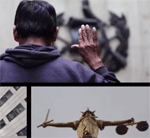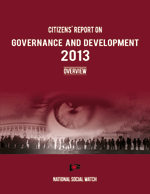Social Watch news
Published on Mon, 2014-06-30 23:56
The United Nations Human Rights Council (HRC) adopted, through a vote, a historic and significant resolution to start a process for an international legally instrument on transnational corporations. Officially entitled “Elaboration of an international legally binding instrument on Transnational Corporations and other Business Enterprises with respect to Human Rights” (A/HRC/26/L.22) the resolution was adopted on 26 June at the 26th session of the HRC. The resolution was co-sponsored by Ecuador and South Africa, and also supported by Bolivia, Cuba and Nevezuela. In the vote on the resolution, 20 Members of the HRC supported the resolution, while 13 Members abstained, and 14 Members voted against it. |
Published on Thu, 2014-06-26 19:25
2015 marks both the target date for the achievement of the Millennium Development Goals (MDGs) and the 20-year review of the Beijing Platform for Action (BPfA). As governments discuss progress made on the MDGs and the BPfA and make commitments on international development and women’s rights for the coming decades, what kinds of financial and fiscal policies are needed to achieve human rights, sustainable development, and gender equality in the post-2015 global development agenda? |
Published on Thu, 2014-06-26 19:17
Political will and political power and sustainable policies at national level as well as national policy space and fair international trade, money and finance systems are essential to tackle poverty and inequality, according to experts at an eminent panel discussion at the UN Conference on Trade and Development (UNCTAD) last week. The experts on the panel were discussing best policy practices for tackling poverty and inequality on the road to achieving sustainable development. The discussion took place in a round-table session on 19 June, during UNCTAD's two-day Public Symposium (18-19 June), which this year coincided with UNCTAD's own fiftieth anniversary celebrations. |
Published on Wed, 2014-06-18 14:55
“The need of a multilateral dept dispute resolution mechanism was highlighted by the financial crisis of 2008 and the debt crises that it unleashed in several European countries. It is dramatically emphasized in these days by the tragic fact that a country like Argentina that is fighting hard to lift its people out of poverty, reconstruct the national economy destroyed by two decades of neoliberalism and recover the trust of the international financial markets is being attacked by unethical “vulture funds” and might be even forced into default by a resolution over its sovereign debt taken by the justice system of another country. This does not only threatens to submerge millions of Argentinians back into poverty but might even put into risk the whole international financial system” said Roberto Bissio, on behalf of Social Watch, during the Special Session of Trade and Development Board organized by UNCTAD Geneva, 17 June 2014. |
Published on Wed, 2014-06-18 10:12
A new GPF working paper, jointly published with Brot für die Welt and MISEREOR, gives an overview of the debate around how to create an international legally binding instrument to hold transnational corporations accountable for human rights abuses. The scope reaches early efforts to formulate the UN Code of Conduct to the current initiative for a binding Treaty on Business and Human Rights. The paper particularly focuses on the responses by TNCs and their leading interest groups to the various UN initiatives, specifies the key actors and their objectives. In this context it also highlights features of the interplay between business demands and the evolution of regulatory debates at the UN. This provides an indication of the degree of influence that corporate actors exert and their ability – in cooperation with some powerful UN member states – to prevent international binding rules for TNCs at the UN. |
Published on Mon, 2014-06-16 00:00
There is almost no dispute that the worst performance of all Millennium Development Goals (MDGs) was registered on MDG 8, the Global Partnership for Development. The impending deliberations to shape the post-2015 development agenda offers a high level political opportunity to correct that imbalance. For that, it is important to avoid treading the same path of the MDG approach. The initial blueprint for the MDGs entirely neglected mention of the means of implementation necessary in the form of international support. Since it was clear that developing countries would never get on board with an agenda that would harshly judge their progress in improving certain quantifiable indicators without correlative commitments of financial support to help achieve them, one more goal was added, and this was Goal 8 on the Global Partnership. Accepting this approach condoned the methodological nonsense of putting means of implementation as a category equivalent to the goals they should serve. It condemned finance for development to the constraints of a format that required simplified, succinct, one-size-fits-all statements that could never capture the breadth, complexity and diversity needed for development finance to work. |
Published on Thu, 2014-06-12 21:46
The Arab NGO Network for Development (ANND) hosted the European Investment Bank (EIB) Vice President, Mr. Philippe de Fontaine Vive along with a team of EIB staff and representatives of the EU delegation to Lebanon on June 10th. The meeting brought together representatives of Lebanese Civil Society and international organizations working in Lebanon. ANND's work and monitoring of the EIB's involvement in the region prompted such a meeting. Since 2005, we could see a change in the EIB policies, which has chosen as interlocutor private local banks with three different measures. The first one enters in the micro-credit process to "facilitate households' access to credit", the second one consists in the implementation of private investment funds for the SMEs and the last one consists to negotiate directly with the local private banks on projects to finance SMEs from specific sectors. |
Published on Thu, 2014-06-05 13:19
Only through financial reform can human rights be sustained. The Center of Concern provides this video for your use in classes, meetings, and other community organizing opportunities to educate viewers regarding the need for financial policy makers to be held accountable to those in marginalized situations and poverty. The brief video stimulates new ways of thinking about equality and social justice and its inextricable linkage to financial systems. The program recommends actions that each of us can and should take to address changes in local and global financial systems to promote and sustain equality and human dignity throughout society. |
Published on Thu, 2014-06-05 11:24
As the Millennium Development Goals (MDGs) reach their end date in 2015, there is broad consensus that the development agenda which replaces them has to be universal. Whereas the MDGs applied to developing countries only, the post-2015 development agenda will apply to all countries. To support the implementation and measurement of the post-2015 development goals, a "data revolution" has been called for that will enable governments and policymakers to better track development progress and give citizens the information they need to demand more from their governments and hold them to account. To respond to this, The Centre for Policy Dialogue (CPD), The North-South Institute (NSI) and Southern Voice on Post-MDG International Development Goals (Southern Voice), have launched the "Post-2015 Data Test: Unpacking the Data Revolution at the Country Level", an initiative that examines how the universal post-2015 development agenda can be applied and measured across a variety of country contexts. |
Published on Sat, 2014-05-31 00:00
Book Review By Prof Kuldeep Mathur The Citizens Report on Governance and Development 2013 is the seventh Citizens’ Report of National Social Watch. Democracy is not an easy system of governance. It is fragile and its essence cannot be guaranteed only because there is an assurance of periodic elections. Its fragility is dependent on several factors among whom is the way its governing institutions function and the kind of policies that are determined by them. This requires constant vigilance lest the people who come into power and institutions that they oversee function according to the mandate given to them by the people who have elected them go astray. This vigilance can be exercised only if there is information available to the people. Thus, transparency and availability of information is critical to hold then accountability. |
SUSCRIBE TO OUR NEWSLETTER











